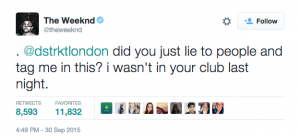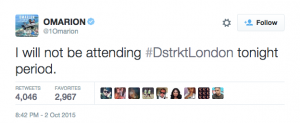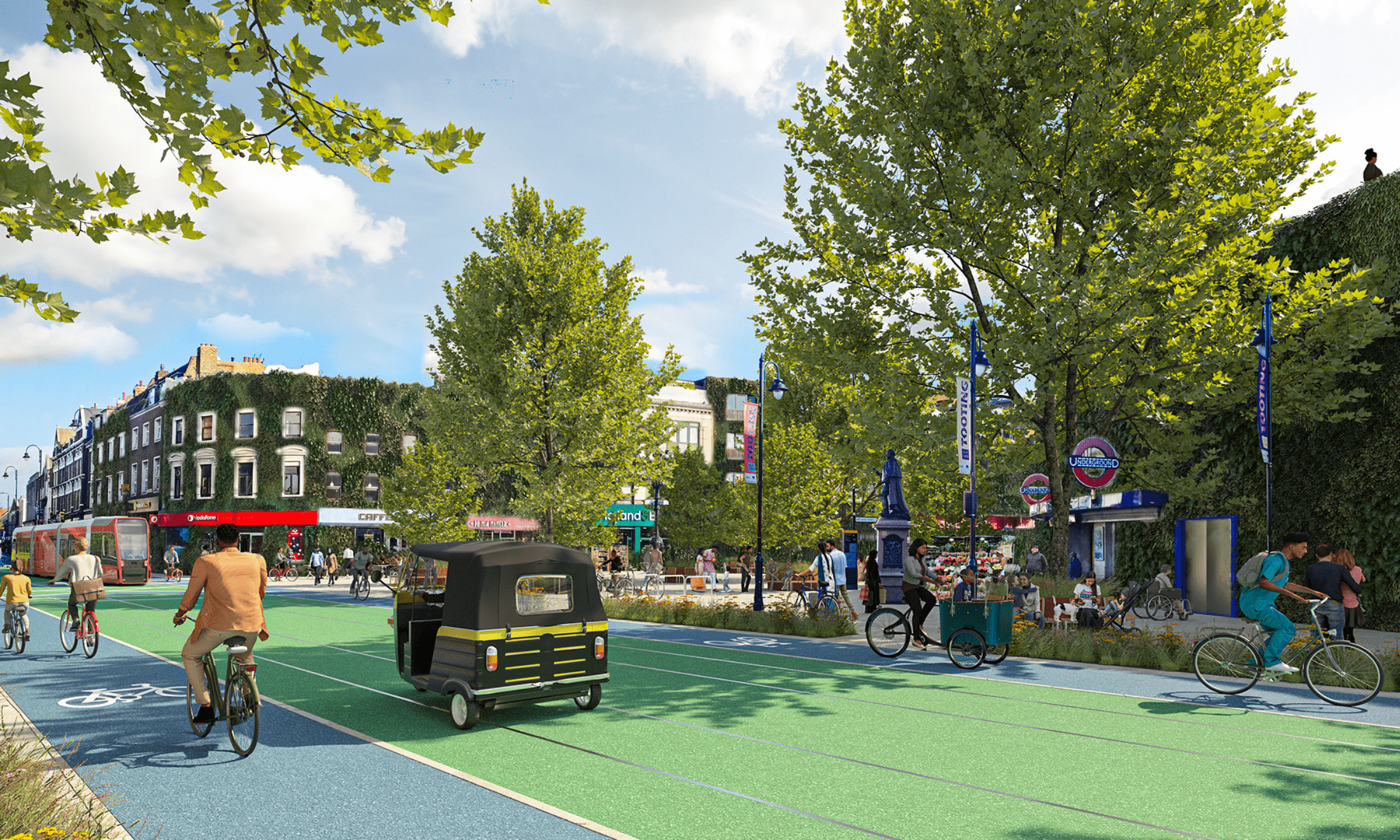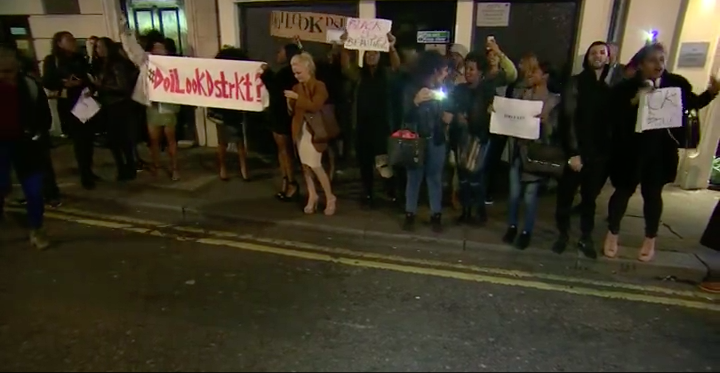
Last week, popular London nightclub DSTRKT faced criticism after allegedly refusing entry to a group of women, on the basis that they were “too dark” and “too overweight” to enter. Members of the group, Zalika Miller and Lin Mei, announced the allegations on social media and returned to protest the decision of the club on Tuesday evening, with signs reading ‘black is beautiful’ and ‘black and proud’, spawning the hashtag #DoILookDSTRKT?
Following this, both men and women stepped forward to retell similar experiences of race-based discriminatioton at DSTRKT and other West End clubs. For many, the brown-paper-bag-style tactics enacted by these spaces are an all-too-familiar part of club culture; used ensure the venue promotes an image which consistently favours the ‘whiter’ and ‘lighter’. As London promoter Sam told Newsbeat, “sometimes they will let dark skin girls in… but they have to be ridiculously pretty”.
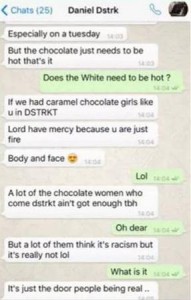
DSTRKT isnt the first nightclub to dish out racial bias at its doors and, unfortunately, they probably won’t be the last. Despite a wave of criticism from the public, and celebrity figures, the club’s staff and some attendees have continued to defend and deny the incident.
Here’s a rundown of why their most popular arguments are problematic and why DSTRKT’s apology is less than sincere.
I see black and mixed race girls in these clubs all the time.”
Yep, so do I. In fact, I am one and I’ve experienced being pulled forward into a line with light-skinned women of colour ahead of darker-skinned women while being asked to pay more than the white girls and less than the darker girls for entry.
These clubs spit colonial rhetoric, accepting white customers automatically while asking darker-skinned individuals to tick more boxes – more make-up, more skin, more money.
Using lighter-skinned women as your poster girls for diversity while allowing them entry ahead of darker-skinned women is racist.
Holding people of colour up to a standard unexpected of white people in order to enter a venue is racist.
Seeing some black and mixed-race girls within a venue while the colour gradient of people outside the venue is policed – still racist.
White girls and white boys get turned away too.”
It’s unfortunate that white people are rejected by clubs as a result of disagreements with sexual orientation or gender identity or because the promoter didn’t like your trainers. However, a history of white people being turned away from spaces as a direct result of racially-driven discrimination does not exist.
We’re discussing the institutionalised mistreatment of dark skinned individuals and the continuous rejection of people of colour from white dominant spaces, while our culture is used as entertainment. Please do not attempt to derail the points we are making.
What’s the big fuss, why don’t you just not go there?”
The protests aren’t about pleading for entry, they’re about exposing the covert racism and elitist behaviour that exists within club culture. Besides, when people of colour do create events that celebrate our musical figures they tend to be heavily monitored and challenged by the police, as explained by rapper JME.
About last night another #fullybooked #Tuesday #soldout @karrueche @LewisHamilton with the sound of to the @theweeknd pic.twitter.com/Boucy2tsqj
— DSTRKT London (@dstrktlondon) September 30, 2015
Just like many other London clubs, DSTRKT welcomes affluent famous black folk to help boost their image. Once again, welcoming only a select group of black people into your club to put on your flyer doesn’t make you racially inclusive.
Oh and actually, they lied about The Weeknd.
“All our tables were fully booked and we had a full general admission guest list and on that basis alone [Zalika Miller’s party] were not granted entry.” – DSTRKT’s Facebook apology
Is the club full every time this happens?
“At least two of the women who made the complaint against DSTRKT, Lin Mei and Zalika Miller, have been allowed entry to our venue in the past.” –DSTRKT’s Facebook apology
Here they are talking about this.
Not only did DSTRKT fail to apologise to the group, they plastered images of Lin Mei at the club (something she had mentioned before) across their Facebook and Twitter in an attempt to shift the blame back on to the victims. The club claimed to have launched an investigation themselves, while taking no responsibility for any external promoter’s comments, before tagging a list of news sources and celebrities in an attempt to appeal to the likes of Beyoncé, Jay Z and, err, Ebony Magazine.
Unfortunately for DSTRKT, this didn’t work for singer Omarion who took to Twitter on Friday to announce his cancelled appearance at the club.
For those of you still under the impression that a ‘race card’ is being pulled, please take a moment to consider why you may not have fallen victim to this behaviour and notice the shared sense of familiarity among people of colour towards rejection and denial from these spaces. This is an institutionalised, reoccurring issue across the UK that appears within more environments than just DSTRKT nightclub. This is deeper than a door policy.
I’ve witnessed it in most West End clubs, door girls attempt to split our groups, allowing the white girls and lighties in and keeping the darker girls out. I’ve even been told by promoters that we must have at least one white girl with us in order to get in. It is a damn shame and has resulted in long-term anxiety associated with going out amongst some of my friends.” – Jessica
At DSTRKT a bouncer came up to tell us we were not going to get in because no one buys dark-skinned girls drinks.” – Leonie
One time me and five other girls went to Cirque le Soir. When we got to the door, the door staff took the name of the promoter and let four of us white girls in but were refusing to let my Asian friend in. The door staff told me not to bring her along again because ‘she isn’t attractive enough’. When we then decided not to enter the club, a girl on the door suggested we go to Funky Buddha as apparently the majority of customers there were Asian.” – Jaye Jae
My management books us tables at West London clubs for publicity and even with that you still have issues. Many of us black and Arab girls have had to learn how to navigate our way around their rules if we want to get in. We put our names on the list as English ones rather than our African and Arab ones, we wear lower cut dresses and try and walk in with the white girls so they think we’re the only minority girls in the group.” – Jolia
I’ve promoted for a lot of high end London clubs and they all tell you the same thing – the black crowd needs to be dressed extra nice, the girls must be extra pretty and the mixed-race girls can’t look as if they will cause trouble. They only fill about a fifth of the club with black people and even less with darker-skinned black people and once that quota is full, that’s it: no more. Clubs have no problem telling groups on the door that the ethnic quota is filled.” – Ryan

